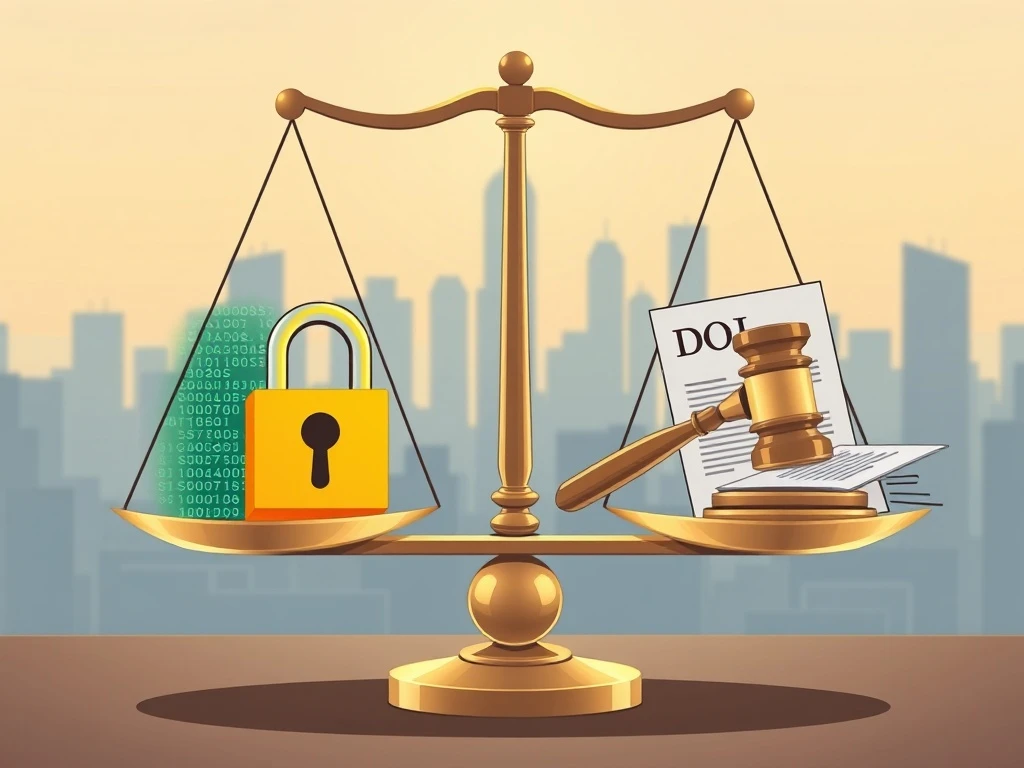Tornado Cash Turmoil: Dragonfly Capital Faces Crucial DOJ Charges, Challenging Crypto Compliance

The world of decentralized finance (DeFi) is no stranger to regulatory scrutiny, but a recent development has sent ripples through the industry: prominent venture capital firm Dragonfly Capital is standing firm against potential DOJ charges related to its past investment in Tornado Cash. This isn’t just about one firm; it’s a pivotal moment that could redefine crypto compliance and DeFi liability for investors across the globe.
Unraveling the Storm: Dragonfly Capital’s Stance on DOJ Charges
Dragonfly Capital, a well-known venture capital firm with a focus on blockchain and cryptocurrency investments, has publicly reaffirmed its commitment to defending itself against potential legal action from the U.S. Department of Justice. The firm’s co-founder and managing partner, Haseeb Qureshi, addressed reports indicating that the DOJ is considering charges against Dragonfly employees connected to the Tornado Cash project, a decentralized cryptocurrency mixer.
Qureshi’s defense hinges on a critical timeline: Dragonfly’s 2020 investment in PepperSec, the developer behind Tornado Cash, was made only after the firm obtained legal confirmation of its compliance with existing U.S. financial regulations. This included specific guidelines issued by FinCEN (the U.S. Treasury’s financial intelligence unit) in 2019. The firm asserts that its due diligence at the time aligned with the prevailing regulatory landscape.
Dragonfly Capital views the potential charges as ‘out of line with the facts and the law,’ arguing that such actions risk stifling innovation, particularly in privacy-focused technologies within the U.S. crypto ecosystem. Qureshi stated, ‘We stand by our investment in open-source privacy tools,’ highlighting the broader implications this case could have for setting a problematic precedent for crypto investors.
Tornado Cash and the Regulatory Whirlwind: Understanding the Sanctions
At the heart of the controversy is Tornado Cash, a decentralized protocol designed to enhance transactional privacy on the Ethereum blockchain by mixing various cryptocurrency inputs to obscure their origins. While proponents argue its importance for financial privacy, its design also made it attractive to illicit actors seeking to launder funds.
The DOJ’s scrutiny stems from the U.S. Treasury Department’s Office of Foreign Assets Control (OFAC) designation of Tornado Cash as a sanctioned entity in August 2022. This designation, enacted under Executive Order 14068, cited the mixer’s alleged role in laundering billions of dollars, including funds stolen in major cyberattacks and ransomware schemes, such as those linked to the North Korean-backed Lazarus Group.
It’s crucial to note the temporal gap: Dragonfly’s investment predates the 2022 sanction by two years. This distinction forms the cornerstone of Dragonfly’s defense, as they contend their actions were compliant at the time of investment, under the regulatory framework then in place.
The Shifting Sands of Crypto Compliance: A Precedent in the Making?
While no formal charges have yet been filed against Dragonfly Capital or its employees, the DOJ’s review signals a significant and broader regulatory push. This effort aims to hold investors accountable for indirect involvement in activities deemed illicit, even if they don’t directly control the sanctioned entity.
Blockchain compliance experts are closely watching this case, describing it as a ‘test of regulatory reach.’ It raises fundamental questions about the extent to which venture capital firms and other investors can be held responsible for the subsequent actions of decentralized projects they fund, especially when those projects evolve or are later used for nefarious purposes. The evolving nature of crypto compliance makes this a particularly complex legal battle.
The outcome of this case could profoundly influence how regulators approach similar situations, particularly those involving projects with ambiguous or evolving legal statuses. It underscores the challenges of conducting thorough due diligence in a rapidly changing technological and regulatory landscape.
Navigating Blockchain Regulation: A Test of Legal Reach
Legal analysts specializing in financial regulation have observed that the DOJ’s stance in the Dragonfly Capital case highlights a clear shift: a prioritization of anti-money laundering (AML) enforcement over the promotion of privacy-centric innovations. This indicates a growing governmental desire to assert control and oversight over the decentralized finance space, even where direct control by investors is minimal.
The case is being closely monitored by industry observers as it could reshape risk management and due diligence practices across the entire blockchain sector. If the DOJ succeeds in establishing investor liability for indirect involvement, it could set a challenging precedent for future investments in decentralized technologies.
The broader implications for blockchain regulation are significant. It forces a re-evaluation of how legal frameworks, traditionally designed for centralized entities, apply to decentralized autonomous organizations (DAOs) and open-source protocols. This ‘test of legal reach’ could lead to clearer, albeit potentially more restrictive, guidelines for participation in the DeFi ecosystem.
DeFi Liability in Focus: What This Means for Future Innovation
Dragonfly’s decision to contest these allegations may embolden other firms to adopt more assertive legal stances when faced with similar regulatory challenges. However, it simultaneously poses a significant deterrent for institutional investors considering supporting projects with inherent compliance uncertainties. A venture capitalist with deep ties to the sector described the case as ‘a pivotal moment,’ emphasizing how the DOJ’s actions highlight the inherent difficulties of navigating evolving regulatory frameworks.
The core issue of DeFi liability remains largely undefined. How far does the responsibility of an investor extend in a decentralized ecosystem where control is distributed and often anonymous? This case will provide crucial insights into how courts interpret the nexus between investment, technology, and illicit activity in the crypto space. The potential for a ‘chilling effect’ on innovation, particularly for privacy-enhancing technologies and open-source development in the U.S., is a major concern for advocates of a free and open internet.
Conclusion: A Pivotal Moment for Crypto’s Future
Dragonfly Capital’s defense strategy centers on demonstrating that its actions were fully compliant with existing regulatory expectations at the time of investment. While the firm has chosen to largely avoid public commentary during its legal preparation, the complexity of the matter underscores the broader challenges facing the crypto industry.
The crypto community remains divided. Some staunchly defend Tornado Cash’s role in promoting financial privacy, arguing it’s a vital tool for legitimate users in a world where financial surveillance is growing. Others support regulators’ unwavering focus on curbing illicit activities, recognizing the need to prevent crypto from becoming a haven for criminals. The DOJ’s enforcement strategy, however, appears firmly aimed at tightening oversight of decentralized technologies, regardless of the level of direct control by investors. The outcome of this case will undoubtedly cast a long shadow over the future of decentralized finance and how innovation can coexist with stringent regulatory demands.
Frequently Asked Questions (FAQs)
What is Tornado Cash?
Tornado Cash is a decentralized cryptocurrency mixer that aims to enhance transactional privacy on the Ethereum blockchain. It works by pooling various cryptocurrency deposits and then distributing them to new addresses, making it difficult to trace the original source of funds. While designed for privacy, it has also been used by malicious actors for money laundering.
Why is Dragonfly Capital being investigated by the DOJ?
Dragonfly Capital is facing potential DOJ charges because of its 2020 investment in PepperSec, the developer of Tornado Cash. The DOJ’s scrutiny intensified after Tornado Cash was sanctioned by the U.S. Treasury in August 2022 for its alleged role in laundering illicit funds. The investigation aims to determine if investors can be held accountable for the subsequent use of projects they funded.
What is Dragonfly Capital’s main defense?
Dragonfly Capital’s primary defense is that its 2020 investment in Tornado Cash’s developer was made after obtaining legal confirmation of its compliance with U.S. financial regulations, including FinCEN guidelines from 2019. They argue that their actions were lawful and compliant at the time of the investment, predating the 2022 sanctions against Tornado Cash.
How could this case impact the broader crypto industry?
This case could set a significant precedent for investor liability in decentralized projects. It might reshape due diligence practices for venture capital firms, making them more cautious about investing in privacy-focused or decentralized finance (DeFi) tools with ambiguous legal statuses. It could also lead to a ‘chilling effect’ on innovation in privacy-preserving technologies within the U.S., as developers and investors might fear future legal repercussions.
What does ‘DeFi liability’ mean in this context?
‘DeFi liability’ in this context refers to the legal responsibility that investors, developers, or participants in decentralized finance projects might incur for the actions or misuse of those protocols. This case is testing the boundaries of that liability, especially when direct control over the decentralized protocol is minimal or non-existent, and when the illicit use occurs after the initial investment.
What are the key takeaways for crypto investors from this situation?
The situation underscores the critical importance of ongoing and rigorous legal and regulatory due diligence for crypto investors. It highlights the dynamic nature of crypto regulation and the potential for retrospective enforcement. Investors should be aware that even indirect involvement in projects that later face sanctions could lead to legal challenges, emphasizing the need for robust compliance frameworks and legal counsel.









